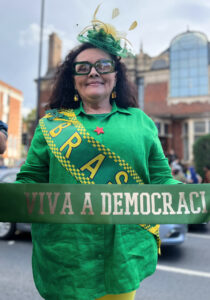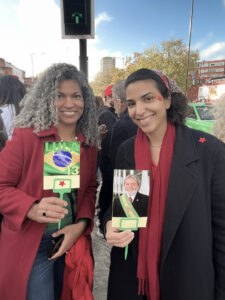Many London-based Brazilians were jubilant after the outcome of the tense Brazilian election race with Luiz Inácio Lula da Silva’s win over Jair Bolsonaro.
Last Sunday, long lines of people waited to cast their ballots. For many this was also an opportunity for music, dances, and chants of “fora Bolsonaro” (Bolsonaro out), as numerous social media videos depict. A scene that Lula supporters described as a “Carna-Lula” or a “Carnival for Lula”.
Natalia G.*, 31, a London resident for five years now, said: “I wasn’t really sure Lula was going to win, (but) if he hadn’t we would have another four years of (the hatred) going on since (Bolsonaro’s) term started.”
In the four years of Bolsonaro’s constituency, elected in 2018, plenty of controversies plagued his image nationally and abroad.
Since taking office in 2019, Bolsonaro attracted three different International Criminal Court investigations, one of which surrounding statements that were deemed encouraging of violence and genocide against Brazil’s indigenous people.
“One can only hope they do a good job for Brazil’s sake and we manage to get out of these dark ages we were in.” adds Natalia.
An estimated 119,000 Brazilians live in the United Kingdom, of which roughly 53,000 in London. For many, seeing their country change from afar has been a source of anxiety.
For Gabriel Senna, 28, knowing that Bolsonaro was no longer president was a balm for his mental health: “keeping up with news from Brazil was a very painful process, because while I wanted to stay informed … I was increasingly impacted by negative news.”
Despite not being a Lula supporter, Senna appreciates that the new president “is a person well regarded by international leaders and is committed to … respecting the democratic structures of the country.”
Bolsonaro’s portfolio flaunts a variety of polarising remarks that attracted international attention. Besides his denigrating and dehumanising statements regarding Brazil’s indigenous tribes, he also launched numerous assaults on the Amazon Rainforest, a matter which has long worried environmental activists in Brazil and in the rest if the world.
Rebeca Binda, 30, believes the new government will include more indigenous peoples in decision making, especially regarding the protection of the environment.
Despite the National Congress being dominated by centre-right Bolsonaro supporters, she sees hope in Sweden’s announcement that they will be restoring funds for the protection of the rainforest: “[under Lula] we will see more reliable politics.”
Elda Cardoso, 43, activist and co-founder of “Frente Preta UK”, is “over the moon” about Lula’s win. Despite calling the win “one of the most beautiful manifestation of democracy in the world” she also recognises that it is but the beginning of what will be a difficult transition.
Cardoso, a black woman herself, was relieved to hear Lula denouncing racism in his appointment speech. She describes the change of government as “waking with a partner, a government that wants to make sure its population is protected.”
Lula will officially take the oath of office on January 1, 2023.

